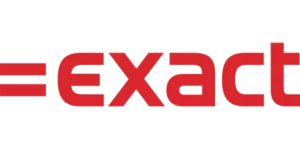Exact Online:
‘E-invoicing will be the new reality in about five years’ time’
Business software developer Exact has been working with e-invoicing specialist tradeinterop for years for their accounting software to make e-invoicing available to their SME customers. Tradeinterop provides connection to Peppol, the international standard for sending, receiving and processing electronic invoices. Kuno Klumpers, Remko Weijers and Koen Baron, all three working in Exact’s product organisation, talk about their experiences with e-invoicing via Peppol, their relationship with tradeinterop and look ahead to the future of e-invoicing.
Everyone knows Exact, but what exactly do you guys do?
Klumpers: ‘Focused on our accounting programme Exact Online, we offer SMEs an integrated online software package with state-of-the-art accounting software and CRM, complemented by specific industry-focused solutions. In addition, Exact also has several solutions for our mid-market customers such as Exact Globe & Globe+ and Exact for Financials. Besides SME entrepreneurs from small to large, our primary target group consists of administration and accounting firms. For SMEs, we have been the market leader in accounting and industry-specific solutions for many years.
How are SMEs doing at the moment?
Klumpers: ‘SMEs do not have it easy everywhere, although there is a difference between the accountancy market and the rest of SMEs. Some of the SMEs are facing solid challenges around repaying the corona loan. This is especially true for sectors that did not emerge easily from the corona period, such as retail. The lockdowns have changed the shopping experience and consumers have become accustomed to ordering online. Across the entire width of the market, we further see, based on data from our ‘SME Barometer’ based on processed data from 340,000 administrations, that since corona, average invoice payment times have increased, cash flow positions have fallen and sales growth has lagged somewhat in some sectors.’
Is there any discernible difference in average payment terms between SMEs that e-invoice via Peppol and invoice with a pdf or on paper?
Weijers: ‘That difference has always been there, since the introduction of Peppol in 2011. Invoices sent via Peppol are generally paid earlier than invoices that find their way to the customer by e-mail or post. This is simply because the administrative operations at both the sender and recipient of an invoice via Peppol are much faster. Go figure: at Peppol, this is done at the click of a button. If, in the favourable case, the sender does this with a pdf invoice via e-mail, he mails the invoice to the recipient, who then processes it in his accounting programme. These are all operations that are unnecessary with Peppol. So later payment by the recipient is not always due to unwillingness, but is also a consequence of the total administrative process surrounding its handling.’
What are other benefits of sending e-invoices via Peppol?
Baron: ‘Besides shortening payment terms and reducing administrative pressure, you can see that the increased digitisation rate means fewer human actions are needed. This reduces the number of errors and increases data quality. This obviously leads to time savings, cost savings and better management information. Furthermore, you no longer lose data, you have better insight into the status of invoices and, as an entrepreneur, you contribute to the impact of corporate social responsibility (CSR). After all, the more digitisation, the lower the CO2 emissions and the fewer trees need to be felled. Finally, it prevents fraud and minimises the receipt of phantom invoices, as both the sender and the recipient of the e-invoice go through a verification process. Now, though, both must then be connected to the Peppol network.’
What is Peppol?
Peppol is the international standard for sending, receiving and processing electronic invoices and orders. With Peppol, governments, businesses and other organisations are able to exchange electronic messages easily, quickly and securely. The Dutch Peppol Authority (NPa) is the regulator of the Peppol appointment system in the Netherlands.
How many Exact Online customers are now working with e-invoicing via Peppol?
Klumpers: ‘At the moment, mainly companies that invoice the government, because then e-invoicing is mandatory. However, we do see more and more SMEs realising the benefits of e-invoicing via Peppol. But there is still a lot to be gained.’
Why is it that smaller SMEs have yet to take the plunge?
Weijers: ‘Unknown makes unloved. In other words, many SMEs have set up their invoicing process in a way that is familiar to them and are logically used to it. At the moment, they do not sufficiently see the advantages. On the other hand, entrepreneurs who have become acquainted with e-invoicing often say: ‘If only we had started with this earlier.’
What are the costs for your customers for using e-invoicing through Peppol?
Weijers: ‘Sending e-invoices is free. That’s standard in our accounting programme Exact Online and can be arranged at the push of a button. For receiving e-invoices, we charge a small amount per invoice and then everything is processed automatically, without the entrepreneur having to rearrange his current administrative process. This ultimately costs the customer much less than entering invoices by hand. In fact, incoming e-invoices are automatically read into the entrepreneur’s accounts.’
Why did you choose tradeinterop for the implementation of Peppol within Exact Online and not do it yourself, for example?
Klumpers: ‘The technical requirements of the Peppol network require dedicated specialists. In tradeinterop, we have found that specialist so we can be sure that the process is in good hands. That’s what we think is most important for our customers. For the implementation, we chose tradeinterop at the time because of the good service they provide and, of course, price also played a role, as always with tenders.’

What are the characteristics of a good service for you?
Klumpers: ‘We have monthly consultations with tradeinterop, because over the years there are always new developments from Peppol. These include new technical developments, functional extensions or simply an update from which our customers can benefit optimally. Tradeinterop makes sure that everything works perfectly again according to these latest developments without our customers having to do anything. Take connecting to the Peppol network, for example; with just a few actions from within the Exact software, this is taken care of. Tradeinterop is therefore a very reliable partner and consultant for us, ensuring that we stay ahead in the market. That is of course very important for us as a market leader.’
What do you think is an essential feature that has been added to Peppol in recent years?
Baron: ‘I really like the fact that as a recipient, you share the invoice status with the sender during booking and possibly also during approval of purchase invoices. So in the invoice history, the sender automatically sees the same invoice status as the recipient. Both can therefore accurately track the invoice status.’
Finally, how do you see the future of e-invoicing via Peppol?
Baron: ‘There is now a proposed EU directive in the pipeline that aims to make e-invoicing mandatory for all business-to-business invoices between EU countries by 2028 or 2029. Some countries, such as Italy and Spain, have already made it mandatory for every invoice to be sent via a central system. It has now also been established for Belgium that e-invoicing will be mandatory from 1 January 2026. So e-invoicing is the future, which is why we think: why wait any longer when it is coming and you as a business owner can already benefit from its many advantages now? Moreover, by reducing the administrative burden, you as an entrepreneur can spend much more time on the things you really like. And that is, in general, not keeping records, but doing business itself.’
Exactly.
We also recorded a great podcast with Exact. In it, Kuno talks about the differences between Scan and Recognise and e-invoicing and why switching to e-invoicing is a good idea. Listen to it here.






